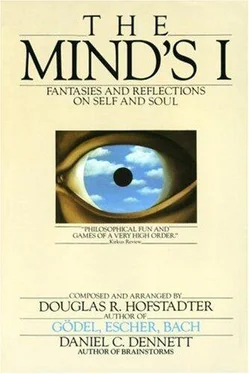Zen is like a man hanging in a tree by his teeth over a precipice. His hands grasp no branch, his feet rest on no limb, and under the tree another person asks him: “Why did Bodhidharma come to China from India?” if the man in the tree does not answer, he fails; and if he does answer, he falls and loses his life. Now what shall he do?
To many physicists the distinction between systems with observer status and those without has seemed artificial, even repugnant. Moreover, the idea that an observer’s intervention causes a “collapse of the wave function”—a sudden jump into one randomly chosen pure eigenstate—introduces caprice into the ultimate laws of nature. “God does not play dice” (“Der Herrgott würfelt nicht”) was Einstein’s lifelong belief.
A radical attempt to save both continuity and determinism in quantum mechanics is known as the “many-worlds interpretation” of quantum mechanics, first proposed in 1957 by Hugh Everett III. According to this very bizarre theory, no system ever jumps discontinuously into an eigenstate. What happens is that the superposition evolves smoothly with its various branches unfolding in parallel. Whenever necessary, the state sprouts further branches that carry the various new alternatives. For instance, there are two branches in the case of Schrödinger’s cat, and they both develop in parallel. “Well, what happens to the cat? Does it feel itself to be alive, or dead?” one must wonder. Everett would answer, “It depends which branch you look at. On one branch it feels itself alive, and on the other there’s no cat to feel anything.” With intuition beginning to rebel, one then asks, “Well, what about a few moments before the cat on the fatal branch died? How did the cat feel then? Surely the cat can’t feel two ways at once! Which of the two branches contains the genuine cat?”
The problem becomes even more intense as you realize the implications of this theory as applied to you, here and now. For every quantum mechanical branch in your life (and there have been billions upon billions), you have split into two or more yous, riding along parallel but disconnected branches of one gigantic “universal wave function.” At the critical spot in his article where this difficulty arises, Everett calmly inserts the following footnote:
At this point we encounter a language difficulty. Whereas before the observation we had a single observer state, afterwards there were a number of different states for the observer, all occurring in a superposition. Each of these separate states is a state for an observer, so that we can speak of the different observers described by different states. On the other hand, the same physical system is involved, and from this viewpoint it is the same observer, which is in different states for different elements of the superposition (i.e., had had different experiences in the separate elements of the superposition). In this situation we shall use the singular when we wish to emphasize that a single physical system is involved, and the plural when we wish to emphasize the different experiences for the separate elements of the superposition. (E.g., “The observer performs an observation of the quantity A, after which each of the observers of the resulting superposition has perceived an eigenvalue.”)
All said with a poker face. The problem of how it feels subjectively is not treated; it is just swept under the rug. It is probably considered meaningless.
And yet, one simply has to wonder, “Why, then, do I feel myself to be in just one world?” Well, according to Everett’s view, you don’t —you feel all the alternatives simultaneously, it’s just this you going down this branch who doesn’t experience all the alternatives. This is completely shocking. The vivid quotes with which we opened our reflection come back and penetrate deeply. The ultimate question is this: “Why is this me in this branch, then? What makes me—I mean this me—feel itself—I mean myself—unsplit?”
The sun is setting one evening over the ocean. You and a group of friends are standing at various points along the wet sand. As the water laps at your feet, you silently watch the red globe drop nearer and nearer to the horizon. As you watch, somewhat mesmerized, you notice how the sun’s reflection on the wave crests forms a straight line composed of thousands of momentary orange-red glints—a straight line pointing right at you! “How lucky that I am the one who happens to be lined up exactly with that line!” you think to yourself. “Too bad not all of us can stand here and experience this perfect unity with the sun.” And at the same moment, each of your friends is having precisely the same thought… or is it the same?
Such musings are at the heart of the “soul-searching question.” Why is this soul in this body? (Or on this branch of the universal wave function?) Why, when there are so many possibilities, did this mind get attached to this body? Why can’t my “I-ness” belong to some other body? It is obviously circular and unsatisfying to say something like “You are in that body because that was the one made by your parents.” But why were they my parents, and not someone else? Who would have been my parents if I had been born in Hungary? What would I have been like if I had been someone else? Or if someone else had been me? Or— am I someone else? Am I everyone else? Is there only one universal consciousness? Is it an illusion to feel oneself as separate, as an individual? It is rather eerie to find these bizarre themes reproduced at the core of what is supposedly our stablest and least erratic science.
And yet in a way it is not so surprising. There is a clear connection between the imaginary worlds in our minds and the alternate worlds evolving in parallel with the one we experience. The proverbial young man picking apart the daisy and muttering, “She loves me, she loves me not, she loves me, she loves me not” is clearly maintaining in his mind (at least) two different worlds based on two different models for his beloved. Or would it be more accurate to say that there is one mental model of his beloved that is in a mental analogue of a quantum-mechanical superposition of states?
And when a novelist simultaneously entertains a number of possible ways of extending a story, are the characters not, so to speak metaphorically, in a mental superposition of states? If the novel never gets set to paper, perhaps the split characters can continue to evolve their multiple stories in their author’s brain. Furthermore, it would even seem strange to ask which story is the genuine version. All the worlds are equally genuine.
And in like manner, there is a world—a branch of the universal wave function—in which you didn’t make that stupid mistake you now regret so much. Aren’t you jealous? But how can you be jealous of your self? Besides which, there’s another world in which you made yet stupider mistakes, and are jealous of this very you, here and now in this world!
Perhaps one way to think of the universal wave function is as the mind—or brain, if you prefer—of the great novelist in the sky, God, in which all possible branches are being simultaneously entertained. We would be mere subsystems of God’s brain, and these versions of us are no more privileged or authentic than our galaxy is the only genuine galaxy. God’s brain, conceived in this way, evolves smoothly and deterministically, as Einstein always maintained. The physicist Paul Davies, writing on just this topic in his recent book Other Worlds, says: “Our consciousness weaves a route at random along the ever-branching evolutionary pathway of the cosmos, so it is we, rather than God, who are playing dice.”
Читать дальше












